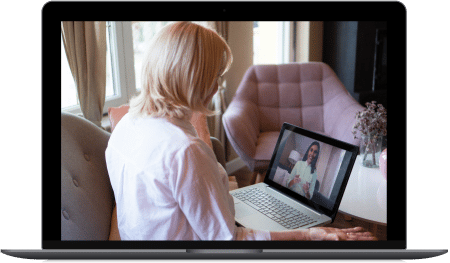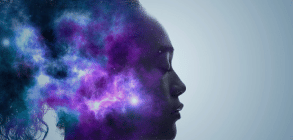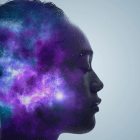
Telehealth Services Available
Benefits of Telehealth
Over the past several years, scientific research consistently shows virtual therapy to be as effective as in-person treatment. It is the most convenient option for a busy schedule, providing more flexibility and being easily accessible. In addition, this method is preferable for exposure techniques, to address the most significant triggers of anxiety or compulsions within your home environment.
Our approach
This section describes approaches that may not be relevant to your personal needs. At the Anxiety & OCD Therapy Center, treatment is a collaborative process, involving a combination of strategies designed to bring you or your child back to a place of optimal functioning and day to day peace.


Cognitive Behavioral Therapy (CBT)
Research-proven treatment that focuses on identifying, challenging and restructuring patterns of thinking and behavior that create and perpetuate anxiety and depression.


Exposure
A critical component of CBT, exposure therapy is a process for reducing fear and anxiety. A person is gradually exposed to a feared activity, place, object or physical sensation, in a planned and controlled manner, becoming desensitized in a gradual way over time. This type of therapy is particularly effective for Panic Disorder with Agoraphobia, Social Anxiety Disorder and Phobias.


Exposure and Response Prevention (ERP)
The proven approach, and gold standard treatment of OCD, also a form of CBT. In ERP therapy, people are placed in situations where they are gradually exposed to their obsessions and asked not to perform the rituals that usually ease their anxiety and distress. This is done at your pace, in a collaborative process with your therapist to minimize discomfort.


Habit Reversal Training (HRT)
HRT includes awareness training, the introduction of a competing response, social support, positive reinforcement, and often relaxation techniques. HRT is used primarily to address specific symptoms and OCD Related Disorders, including Body-Focused Repetitive Behaviors (BFRBs), Trichotillomania (hair pulling), and Excoriation Disorder (skin picking).


Individual Therapy
Our approach is tailored to best suit each individual. For adolescents and adults, the initial focus is on providing a safe, non-judgmental environment, establishing the foundation for our work together. With thorough assessments, the primary approach and techniques are based on the unique issues that you bring to therapy.


Interpersonal & Psychodynamic Therapy
Psychotherapy that focuses on interpersonal issues, which are understood to be a factor in the origin and continuance of psychological distress. Often utilized in conjunction with other techniques, to target symptom resolution, improved interpersonal skills and relationships, and increased social support.


Family Therapy
The symptoms of anxiety and depression affect not only the person with the diagnosis but can have a significant impact on family members as well. Family therapy can take different forms. To help engage tweens and adolescents in treatment, we will educate you as a parent and teach you how to best respond to your child’s anxiety. You may become a partner in your child’s treatment, helping them build coping skills that will last a lifetime.
In other cases, family therapy can be a collaboration that focuses on developing constructive communication and building positive interactions and healthier relationships.
ANXIETY DISORDERS
Anxiety is an important part of our makeup as humans. It helps us get out of harm’s way, prepare for critical events, and it warns us when we need to take action to protect ourselves or those we love.
If you or your child’s anxiety is chronic and excessive, or interferes with daily activities and relationships, it may be an anxiety disorder, the most common behavioral health issue affecting children and adults.
Anxiety Disorders are extremely responsive to CBT and the techniques used at The Anxiety & OCD Therapy Center, will help you manage and overcome your symptoms. The skills that you, or your child acquire will guide you through life’s most challenging circumstances.
OCD & OCD RELATED DISORDERS
OCD is characterized by intrusive thoughts and repetitive behaviors that cause distress and create a substantial burden for effected individuals. The obsessions are recurrent, persistent thoughts, experienced as intrusive or inappropriate, causing considerable anxiety. Compulsions are behaviors or mental acts performed as a way of preventing or alleviating the anxiety triggered by intrusive thoughts.
Individuals with OCD recognize that the obsessions and the rituals employed to prevent feared harm or negative consequences are unreasonable, but the doubt and anxiety is often too great to prevent them from performing repetitive compulsions.
Body Dysmorphic Disorder
An obsessive focus on a perceived flaw in appearance. BDD can interfere with daily functioning, lead to social isolation and unnecessary cosmetic procedures or surgery.
Health Anxiety (Hypochondriasis)
Excessive worry that you are, or may become ill. The preoccupation with bodily functions, physical discomfort, or oddities, can affect daily life.
Body-Focused Repetitive Behaviors (BFRBs)
A group of obsessive self-grooming behaviors that can cause unintentional damage to the body. They include, Excoriation Disorder (skin picking), Trichotillomania (hair pulling) and nail biting.
At The Anxiety & OCD Therapy Center, we provide the most current and effective techniques to overcome the limitations of these disorders and help you regain the life you want to live.
OCD can present in many different forms including:
Contamination Fears
Fear of Causing Harm
Aggressive Obsessions
Counting, Ordering and Arranging
Checking and Repeating
Mental Rituals
Religious Obsessions
Sexual Obsessions
Purely Obsessional OCD, involving distressing intrusive thoughts
Clinical depression is characterized by symptoms including:
A sense of hopelessness, worthlessness, or despair
Loss of interest in most or all activities
Significant changes in appetite and weight, either losing or gaining in a short period of time
An inability to sleep, or the drive to sleep all the time
Diminished ability to concentrate, make decisions or experience any type of pleasure
Loss of energy, and for some, recurrent thoughts of suicide
DEPRESSION
The general public may say they are depressed in a casual manner. For those who suffer with severe clinical depression, the experience can have devastating effects on them and those close to them.
Post-Partum and Seasonal Affective Disorder also fall within the spectrum of Clinical Depression.
We utilize Behavioral Activation, Acceptance and Commitment Therapy (ACT), and other proven approaches to manage clinical Depression.
About Nina
While working full-time for Non-Profit agencies, Nina began a part-time private practice in 1997.
As Coordinator of the Anxiety Treatment Center at St. Clare’s Behavioral Health, she acquired extensive training and experience helping people regain their lives with effective coping skills for Anxiety Based Disorders, including Panic Disorder, Social Anxiety Disorder, OCD and Related Disorders, Specific Phobias and Generalized Anxiety in children, adolescents, and adults.
Along the way, she trained colleagues and clinicians throughout the Hospital system and educated the public about effective treatments.
